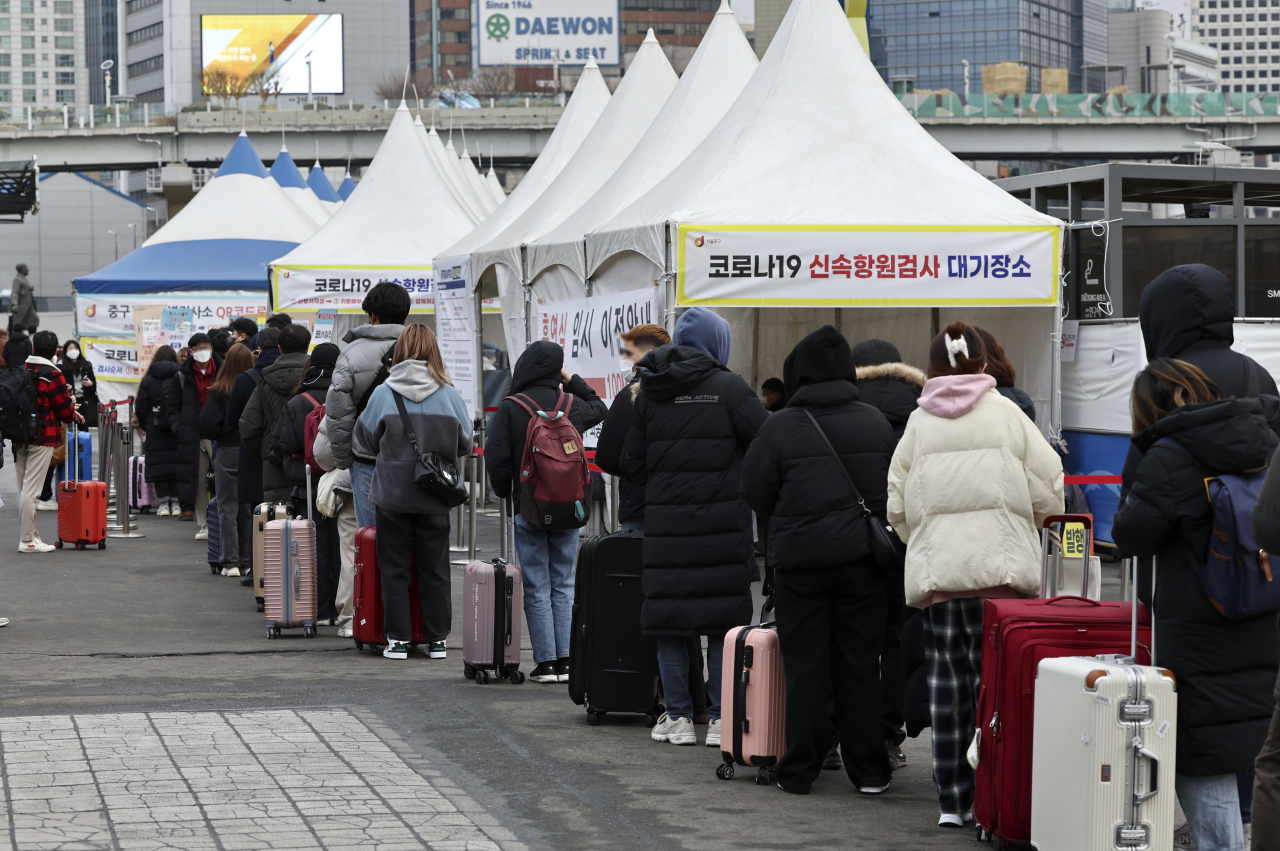 |
People wait in long lines outside a testing center in Seoul Station to take a rapid antigen test on Monday. (Yonhap) |
South Korea is rolling out fourth doses of COVID-19 vaccines to immunocompromised individuals and residents of nursing homes and other long-term care facilities starting this month.
Novavax’s vaccine will be offered to people who remain unvaccinated and also in a mixed regimen to people who have had an adverse reaction to a dose of a different vaccine.
According to a Korea Disease Control and Prevention Agency announcement Monday, the fourth dose of an mRNA vaccine -- either from Pfizer or Moderna -- can be taken up after a minimum interval of 90 or 120 days since the third shot.
Estimates show there around 1.8 million people eligible for the additional booster -- 1.3 million immunocompromised people and around 500,000 nursing home workers and residents, for whom the third dose opened back in November.
Dr. Kim Woo-joo, infectious disease expert and Korean Vaccine Society president, said immunocompromised patients may not produce an adequate response even after being boosted, and that for them getting a fourth may be needed to elicit protection.
“But evidence is still scarce whether a fourth shot will be necessary for the general population, or even older adults who aren’t immunocompromised,” he added.
Dr. Jung Jae-hun, who has been conducting vaccination risk-benefit analyses for the government, said that no analysis was conducted with regard to the fourth dose.
“But most experts agree on giving a fourth vaccination to older adults living in group homes,” he said.
As for third doses for under-18s, Jung said “a review is in order for adolescents.” High school seniors taking college entrance exams are currently the only minors eligible to take boosters.
Despite the restricted PCR testing, new case counts have stayed above 50,000 for the fifth consecutive day on Monday, the highest ever to be logged throughout the pandemic. From Feb. 3, PCR tests have been offered only to people ages 60 and older, people who live in the same household as a PCR test-confirmed patient, and people who have tested positive in rapid antigen tests.
Health Ministry spokesperson Son Young-rae warned in Monday’s closed-door briefing that “deaths and hospital admissions may start to rise from this week.”
He said the severe case rates were “still well within the health care system’s capacity.” The ministry predicts hospitals nationwide can together manage up to 1,500 severely or critically ill patients at a time without being overburdened.
Although the intensive care units are less occupied, beds for mildly sick patients are filling up fast. As of Sunday afternoon about 25 percent of ICU beds for COVID-19 patients were full. The occupancy rate for semi-ICUs was 45 percent.
Reported outbreaks at nursing homes are growing, raising fears it would push hospitalizations up further. According to Saturday’s situational report, at least 48 outbreaks involving nursing facilities were identified across the country.
The number of patients self-isolating at home has reached a record 214,800 by Sunday. Per the guidance updated Feb. 9, COVID-19 patients now isolate for seven days since the day the PCR test was taken, regardless of their vaccination status.
By Kim Arin (
arin@heraldcorp.com)








![[Out of the Shadows] Seoul room clubs offer drugs to compete for clientele](http://res.heraldm.com/phpwas/restmb_idxmake.php?idx=644&simg=/content/image/2024/11/05/20241105050566_0.jpg)